GALLUP NEWS SERVICE
PRINCETON, NJ -- In the wake of Secretary of State Colin L. Powell's appearance before the United Nations Security Council last week, as well as President George W. Bush's speech to the nation the week before, public support for war against Iraq appears to be on the rise, according to the latest CNN/USA Today/Gallup poll. Overall, 63% of Americans support an invasion of Iraq, up from 58% last week prior to Powell's U.N. presentation, and 52% the week before, prior to Bush's State of the Union speech. The percentage of supporters with firm opinions has also increased, to 37% from 31% last week.
A solid majority of Americans say that the Bush administration has made a convincing case for military action against Iraq. The percentage is slightly higher than it was last week, but is up by seven points over the past two weeks. Also compared with last week, Americans are now more likely to say that Iraq is obstructing U.N. weapons inspectors, has facilities to create weapons of mass destruction, and has biological or chemical weapons.
At the same time, Americans remain unconvinced that Iraq represents an immediate threat to the United States, and only four in 10 are willing for the United States to invade Iraq without a new authorizing vote by the U.N. Security Council.
The poll was conducted Feb. 7-9, and shows that support for an invasion of Iraq is the highest it has been since November 2001, shortly after the 9/11 terrorist attacks.
| Public Support for Invading Iraq June 2002-February 2003 |
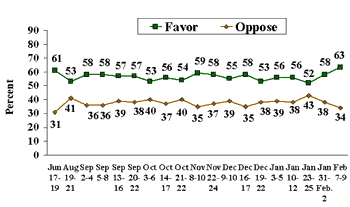 |
The new poll also shows a movement toward greater firmness in opinion; 37% of Americans now say they favor an invasion and will not change their minds, up from 31% last week. Still, that leaves a substantial number of supporters, or 26% of all Americans, who say they could change their minds and turn against the war. Opposition to the war is at 34%, with 14% of the public saying their opposition is firm, and another 20% saying they could change their minds to favor the war. Overall, 49% of Americans appear persuadable to one point of view or the other -- 46% who say their minds could be changed and 3% who have not yet formed an opinion. Last week the comparable number of persuadable Americans was 56%.
| Public Opinion on Invasion of Iraq |
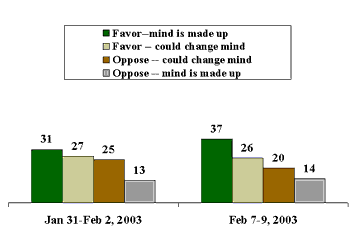 |
Positive Marks for Bush Administration
The Bush administration is getting high marks for having a clear and well-thought-out policy on Iraq. Five months ago, in September 2002, Americans were evenly divided on this matter, with 46% giving a positive assessment and 48% a negative one. Today, the consensus is clearly positive, by 59% to 35%.
| Does the Bush Administration Have a Clear and Well-Thought-Out Policy on Iraq? |
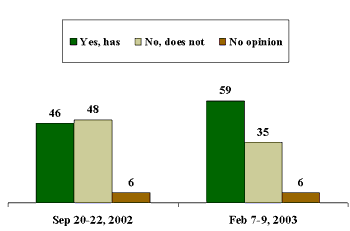 |
Two weeks ago, Americans were also divided over whether the Bush administration had made a convincing case for military action against Iraq -- 49% said it had and 48% said it had not. Last week, the public was more positive, with comparable figures at 53% to 44%. The latest poll shows an even larger majority expressing a positive view, by 56% to 41%.
| Has the Bush Administration Made a Convincing Case About the Need for Action Against Iraq? |
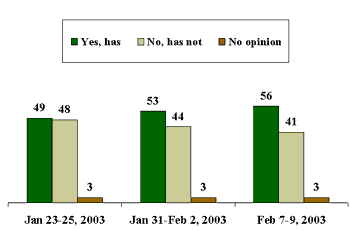 |
Part of the case for military action depends on convincing Americans that Iraq is hindering U.N. inspectors, possesses weapons of mass destruction, and is linked with the al Qaeda terrorist network. The poll shows that Americans are largely inclined to believe those charges.
| Public Certainty of Charges Against Iraq |
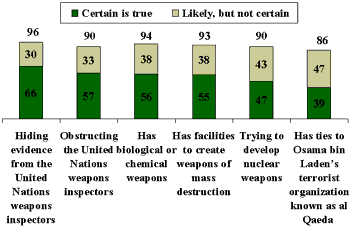 |
More than eight in 10 Americans believe all of the charges are at least "likely" to be true, with more than half saying they are "certain" four of the charges are true. Americans are not as convinced that Iraq is trying to develop nuclear weapons, and they are least certain (just 39% say they are certain) that Iraq has ties to Osama bin Laden's terrorist organization known as al Qaeda.
Perhaps in part because of Powell's appearance, over the past week there has been an increase in the percentage of Americans who are certain that Iraq is obstructing U.N. weapons inspectors (from 52% to 57%), has facilities to create weapons of mass destruction (46% to 55%), and has biological or chemical weapons (50% to 56%). (The question concerning Iraq's attempts to develop weapons of mass destruction was not asked last week, and the question on Iraq's ties to the al Qaeda network shows no change from last week.)
Other findings show that a majority of Americans believe each of the following:
- That the United States has done all it can do to solve the crisis with Iraq diplomatically, by 54% to 42%. Last December, the comparable figures were 52% to 44%, but last October, the public was about evenly divided, at 46% yes to 49% no.
- That the United States should invade Iraq within the next few weeks unless Saddam Hussein shows convincing evidence Iraq is disarming (52%), rather than sending more U.N. weapons inspectors and giving them all the time they need to determine whether Iraq has weapons of mass destruction (45%).
The last item may be considered somewhat mixed, however, as support for an invasion is far lower than the overall 63% figure noted earlier. This lower support figure of 52% is no doubt due to the fact that in this question Americans are given the option of continuing the inspections, as proposed by Germany and France.
The Public's Reservations
Despite the generally supportive views of a possible war with Iraq, Americans are not willing for the United States to initiate military action without another U.N. vote authorizing the action. Just 39% of Americans take that point of view, while another 34% say they would support an invasion only if the United Nations holds a new vote, and 23% are opposed regardless. Thus, without a new U.N. vote, 57% of Americans are opposed.
| Contingencies for Invading Iraq |
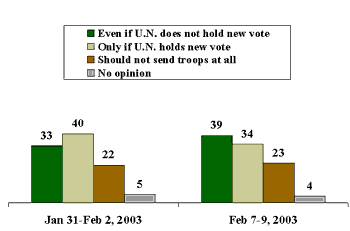 |
The public's view has shifted somewhat from where it was a week ago. At that time, 62% of Americans opposed an invasion without a new U.N. vote (40% wanted the vote and 22% wanted no war at all), and only 33% favored a war without a new U.N. vote.
Despite the Bush administration's efforts to convince the public that Iraq poses an immanent threat to the United States, just 36% agree about the immediacy of the Iraqi threat. A clear majority, 62%, disagree -- 56% say Iraq is a long-term, not an immediate threat, and another 6% say Iraq is not a threat to the United States at all.
| Public Opinion of Iraqi Threat to the United States |
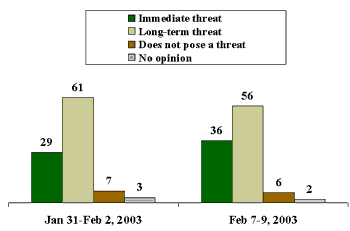 |
The most recent figures represent a shift toward the Bush administration's point of view compared with the findings of a week ago.
One reason for the high level of support for an invasion of Iraq, despite the widespread public perception that Iraq is not an immediate threat, is that a majority of people who say Iraq is only a long-term threat still support an invasion, by a margin of 55% to 42%. People who view Iraq as an immediate threat support an invasion by 82% to 15%.
Survey Methods
The latest results are based on telephone interviews with 1,003 national adults, aged 18 and older, conducted Feb. 7-9, 2003. For results based on the total sample of national adults, one can say with 95% confidence that the margin of sampling error is ±3 percentage points. In addition to sampling error, question wording and practical difficulties in conducting surveys can introduce error or bias into the findings of public opinion polls.
Next, we'd like to ask you some questions about Iraq. First,
Would you favor or oppose invading Iraq with U.S. ground troops in an attempt to remove Saddam Hussein from power?
|
Favor |
Oppose |
No opinion |
||
|
% |
% |
% |
||
|
2003 Feb 7-9 |
63 |
34 |
3 |
|
|
2003 Jan 31-Feb 2 |
58 |
38 |
4 |
|
|
2003 Jan 23-25 |
52 |
43 |
5 |
|
|
2003 Jan 10-12 |
56 |
38 |
6 |
|
|
2003 Jan 3-5 ^ |
56 |
39 |
5 |
|
|
2002 Dec 19-22 ^ |
53 |
38 |
9 |
|
|
2002 Dec 16-17 ^ |
58 |
35 |
7 |
|
|
2002 Dec 9-10 |
55 |
39 |
6 |
|
|
2002 Nov 22-24 |
58 |
37 |
5 |
|
|
2002 Nov 8-10 |
59 |
35 |
6 |
|
|
2002 Oct 21-22 |
54 |
40 |
6 |
|
|
2002 Oct 14-17 ^ |
56 |
37 |
7 |
|
|
2002 Oct 3-6 |
53 |
40 |
7 |
|
|
2002 Sep 20-22 ^ |
57 |
38 |
5 |
|
|
2002 Sep 13-16 † |
57 |
39 |
4 |
|
|
2002 Sep 5-8 ^ † |
58 |
36 |
6 |
|
|
2002 Sep 2-4 † |
58 |
36 |
6 |
|
|
2002 Aug 19-21 † |
53 |
41 |
6 |
|
|
2002 Jun 17-19 ^ † |
61 |
31 |
8 |
|
|
2001 Nov 26-27 ‡ |
74 |
20 |
6 |
|
|
2001 Feb 19-21 ‡ |
52 |
42 |
6 |
|
|
1993 Jun 29-30 ‡ |
70 |
27 |
3 |
|
|
1992 Mar 30-Apr 5 ‡ ? |
55 |
40 |
5 |
|
|
^ |
Asked of half sample. |
|||
|
† |
WORDING: Would you favor or oppose sending American ground troops to the Persian Gulf in an attempt to remove Saddam Hussein from power in Iraq? |
|||
|
‡ |
WORDING: Would you favor or oppose sending American troops back to the Persian Gulf in order to remove Saddam Hussein from power in Iraq? |
|||
|
? |
Life Magazine/Gallup. |
|||
Do you think the United States should invade Iraq with ground troops – [ROTATED: only if the U.N. holds a new vote that authorizes the use of U.S. ground troops, even if the U.N. does not hold a new vote that authorizes the use of U.S. ground troops], or do you think the United States should not send ground troops to Iraq at all?
|
|
|
Even if U.N. does not hold new vote |
Should not send troops |
|
|
2003 Feb 7-9 |
34% |
39 |
23 |
4 |
|
2003 Jan 31-Feb 2 |
40% |
33 |
22 |
5 |
Which comes closer to your view – [ROTATED: the United States should invade Iraq with ground troops in the next few weeks unless Saddam Hussein shows convincing evidence that Iraq is disarming its weapons of mass destruction, (or) the United States should support the United Nations in sending more inspectors and allowing them all the time they need to determine whether Iraq has weapons of mass destruction]?
|
Should invade in |
Should send |
No |
|
|
2003 Feb 7-9 |
52% |
45 |
3 |
Q.14-15 SPLIT SAMPLED
Do you think the Bush administration has a clear and well-thought-out policy on Iraq, or not?
BASED ON --499-- NATIONAL ADULTS IN FORM A
|
Yes, has |
No, does not |
No opinion |
|
|
2003 Feb 7-9 |
59% |
35 |
6 |
|
2002 Sep 20-22 |
46% |
48 |
6 |
Do you think the Bush administration has – or has not—made a convincing case about the need for the U.S. to take military action against Iraq?
BASED ON –501—NATIONAL ADULTS IN FORM B
|
Yes, has |
No, has not |
No opinion |
||
|
2003 Feb 7-9 ^ |
56% |
41 |
3 |
|
|
2003 Jan 31-Feb 2 † |
53% |
44 |
3 |
|
|
2003 Jan 23-25 † |
49% |
48 |
3 |
|
|
^ |
Asked of a half sample. |
|||
|
† |
WORDING: Do you think George W. Bush has – or has not—made a convincing case about the need for the U.S. to take military action against Iraq? |
|||
Do you think the United States has done all it can do to solve the crisis with Iraq diplomatically, or not?
|
Yes, has |
No, has not |
No opinion |
|
|
2003 Feb 7-9 |
54% |
42 |
4 |
|
2002 Dec 9-10 |
52% |
44 |
4 |
|
2002 Oct 3-6 |
46% |
49 |
5 |
|
1991 Jan 11-13 |
60% |
33 |
7 |
Which comes closest to your view – [ROTATED: Iraq poses an immediate threat to the United States, Iraq poses a long-term threat to the U.S., but not an immediate threat, or Iraq does not pose a threat to the United States at all]?
|
Immediate |
Long-term |
Does not pose |
No |
|
|
2003 Feb 7-9 |
36% |
56 |
6 |
2 |
|
2003 Jan 31-Feb 2 |
29% |
61 |
7 |
3 |
Which of the following statements best describes your view of whether –[ITEMS A-E ROTATED, THEN ITEM F READ]?Would you say– [ROTATED: you are certain that this is true, you think it is likely that this is true, but you are not certain, you think it is unlikely that this is true, but you are not certain, (or) you are certain that this is NOT true]?
A. Iraq is obstructing the United Nations weapons inspectors
|
|
|
Unlikely but not certain |
|
|
||
|
2003 Feb 7-9 |
57% |
33 |
7 |
2 |
1 |
|
|
2003 Jan 31-Feb 2 ^ |
52% |
38 |
7 |
1 |
2 |
|
|
^ |
Asked of a half sample. |
|||||
B. Iraq has facilities to create weapons of mass destruction
|
|
|
Unlikely but not certain |
|
|
||
|
2003 Feb 7-9 |
55% |
38 |
5 |
1 |
1 |
|
|
2003 Jan 31-Feb 2 ^ |
46% |
49 |
4 |
* |
1 |
|
|
^ |
Asked of a half sample. |
|||||
C. Iraq has biological or chemical weapons
|
|
|
Unlikely but not certain |
|
|
||
|
2003 Feb 7-9 |
56% |
38 |
4 |
1 |
1 |
|
|
2003 Jan 31-Feb 2 ^ |
50% |
44 |
4 |
* |
2 |
|
|
^ |
Asked of a half sample. |
|||||
D. Iraq is trying to develop nuclear weapons
|
|
|
Unlikely but not certain |
|
|
|
|
2003 Feb 7-9 |
47% |
43 |
7 |
1 |
2 |
E. Iraq has ties to Osama bin Laden's terrorist organization known as al Qaeda
|
|
|
Unlikely but not certain |
|
|
||
|
2003 Feb 7-9 |
39% |
47 |
10 |
2 |
2 |
|
|
2003 Jan 31-Feb 2 ^ |
39% |
48 |
9 |
1 |
3 |
|
|
^ |
Asked of a half sample. |
|||||
F. Iraq is hiding evidence from the United Nations weapons inspectors
|
|
|
Unlikely but not certain |
|
|
|
|
2003 Feb 7-9 |
66% |
30 |
2 |
1 |
1 |
* -- Less than 0.5%
